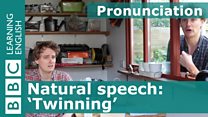Unit 2: Towards advanced
Grammar, news, vocabulary and pronunciation
Select a unit
- 1 Towards advanced
- 2 Towards advanced
- 3 Towards advanced
- 4 Towards advanced
- 5 Towards advanced
- 6 Towards advanced
- 7 Towards advanced
- 8 Towards advanced
- 9 Towards Advanced
- 10 Towards Advanced
- 11 Towards Advanced
- 12 Towards Advanced
- 13 Towards Advanced
- 14 Towards Advanced
- 15 Towards Advanced
- 16 Towards Advanced
- 17 Towards Advanced
- 18 Towards Advanced
- 19 Towards Advanced
- 20 Towards Advanced
- 21 Towards Advanced
- 22 Towards Advanced
- 23 Towards Advanced
- 24 Towards Advanced
- 25 Towards Advanced
- 26 Towards Advanced
- 27 Towards Advanced
- 28 Towards Advanced
- 29 Towards Advanced
- 30 Towards Advanced
Session 5
Tim's Pronunciation Workshop: Linking /r/
What happens when a word ends with a /ɔː/ sound - and the next word begins with a vowel sound?
Activity 1
Tim's Pronunciation Workshop: Linking /r/
Can somebody call for an ambulance?
Tim's back in his pronunciation workshop. This time he's looking at an aspect of connected speech called linking /r/. Find out what it is and how to use it - and why Tim needs an ambulance!
To do
Take a look at the video, then try the activity to do some practice.
Watch the video and complete the activity

Tim
Hi, I'm Tim and this is my pronunciation workshop. Here I'm gonna look at English as it's really spoken. It'll make you a better listener and a more fluent speaker. Come on, let's go inside.
Today, we're talking about war. War, what is it good for? Well, as it turns out, it can be used to help illustrate a feature of fluent speech. As you can see, we write war with three letters: w-a-r, but when we pronounce it, there are only two sounds: /w/ /ɔː/.
The 'r' in the spelling is not pronounced in the word itself, or if the next word begins with a consonant sound. But have a listen to this. We went out and asked people in the streets of London to name a famous Russian book. This is what they said:
Voxpops
Oh the most famous Russian book I can think of is War and Peace.
War and Peace.
War and Peace.
War and Peace.
Tim
Simple, right? Everybody knows War and Peace.
Voxpops
I've never heard of the book War and Peace.
Tim
Well, almost everybody. But have another listen to the way they say it.
Voxpops
War and Peace.
War and Peace.
War and Peace.
War and Peace.
Tim
The word after war begins with a vowel sound. And in this case, the 'r' is pronounced. War and Peace, War and Peace. This is called a 'linking r' and it helps to make the words flow together more smoothly in natural speech. Here are some more examples:
Examples
You know, I really like my mother-in-law.
Have you been to the Tower of London?
You've got something in your eye.
Never again!
Tim
So, you've heard the examples - now it's your turn. Are you ready to give it a try? Listen and repeat.
Examples
You know, I really like my mother-in-law.
Have you been to the Tower of London?
You've got something in your eye.
Never again!
Tim
How did you get on? Great. Remember, if you want to read more about this topic please visit our website, bbclearningenglish.com. That's everything from the pronunciation workshop this week. Bye.
Can somebody call for an ambulance? Please!
To do
Got that? Now try this activity to get some more practice.
The linking 'r' game
6 Questions
How many linking 'r's are there in each sentence? You decide...
Help
Activity
How many linking 'r's are there in each sentence? You decide...
Hint
When a word ends with an 'r' and the next word starts with a vowel, we often use a linking 'r'.Question 1 of 6

Help
Activity
How many linking 'r's are there in each sentence? You decide...
Hint
When a word ends with an 'r' and the next word starts with a vowel, we often use a linking 'r'.Question 2 of 6

Help
Activity
How many linking 'r's are there in each sentence? You decide...
Hint
When a word ends with an 'r' and the next word starts with a vowel, we often use a linking 'r'.Question 3 of 6

Help
Activity
How many linking 'r's are there in each sentence? You decide...
Hint
When a word ends with an 'r' and the next word starts with a vowel, we often use a linking 'r'.Question 4 of 6

Help
Activity
How many linking 'r's are there in each sentence? You decide...
Hint
When a word ends with an 'r' and the next word starts with a vowel, we often use a linking 'r'.Question 5 of 6

Help
Activity
How many linking 'r's are there in each sentence? You decide...
Hint
When a word ends with an 'r' and the next word starts with a vowel, we often use a linking 'r'.Question 6 of 6

Excellent! Great job! Bad luck! You scored:
End of Unit 2
We hope that was useful. In Unit 3, Sian brings you another English Masterclass - in this one, she'll be explaining how to use the present tense to talk about the past, and Tim will be back in the pronunciation workshop looking at more ways to improve your pronunciation. Plus, find out which words are making the headlines in News Review - and don't miss out on LingoHack!
Session Vocabulary
Linking /r/
Words that end with an /ɔː/ sound are often pronounced with an /r/ sound at the end, which links to the next word if that word begins with a vowel. Some examples of phrases where this might happen include:
- Can somebody call for an ambulance?
- I haven't read War and Peace.
- You've got something in your eye.


